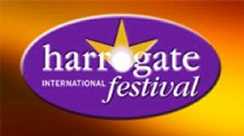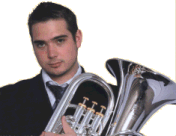Archive - Harrogate International Festival 2004


For the first time the Band has been invited to perform as part of the Harrogate International Festival.
The concert will take place on Wednesday 4th August at 8pm at St Wilfrids Church, Duchy Road, Harrogate, and will feature guest artist David Childs, the internationally acclaimed euphonium soloist. David will also be starring in one of the BBC Promenade concerts at the Royal Albert Hall on 2nd September.
The theme for the concert will be Russian and British Music. Also included in the concert will be a special guest spot for Euphonium player Joe Symonds, who is cycling from Lands End to John o' Groats to raise funds for the Institute for Cardiovascular Research, playing a concert each night on his ride.
Glinka's opera Russlan and Ludmilla was based on a charming and satirical fairy tale by Alexander Pushkin. He completed the score in April 1842 after working on it sporadically over a six-year period. Its themes are largely drawn from Russian folk music making it one of the earliest musical examples of Russian nationalism.
Just as I Am - Wilfred Heaton (1937-2002)
The enigmatic Wilfred Heaton lived in Harrogate for the later part of his life, teaching, composing and studying. He composed a small but highly significant volume of music for brass band, all of the highest quality of invention. This meditation, composed for the Salvation Army in 1939, is a tone poem in miniature, a beautifully crafted meditation on the hymn tune melody.
Euphonium Concerto - Philip Wilby (Soloist: David Childs)
Philip Wilby's Concerto for Euphonium was originally composed for Robert Childs and the Black Dyke Band in 1996 when the composer was living in Birstwith, just outside Harrogate. It was later rescored by the composer for euphonium and symphony orchestra for David Childs to perform with the BBC Philharmonic Orchestra in the final concert of the BBC Young Musician of the Year 2000. The Concerto's extended length seeks to explore that fine combination of sustained lyricism and explosive virtuosity, which typifies the modern euphonium in the most expert hands. There are two parts that divide into four movements. Part One opens with a sonata structure movement marked 'Non troppo allegro', which alternates between a melodic style and some rapid passagework. As the tempo indication suggests, however, the intention of the music is a firm and cerebral development of the opening fourth-based motifs. At the tranquil conclusion of this music, the second movement bursts in with a Greek Island dance. The movement is rapid and extrovert and is subtitled Zeibekikos - that is, the traditional dance of the Greek Islands, which involves smashing plates and lifting tables in one's teeth! Part Two opens with an exploratory section which re-examines some of the opening material surrounded by cadenzas, and is centred upon a short and sustained Adagio. The final movement, marked 'Allegro vivace', opens with a rapid fugal section, which moves inexorably towards a climactic return of the music and tonality of the opening bars of the work.
Comedians' Galop - Dimitri Kabalevsky (1904-87)
Kabalevsky was a Soviet composer whose music often made use of Russian folk melodies and is heavily nationalistic and politically oriented. His Suite: The Comedians was composed in 1940, shortly after the composer had been appointed Professor of Music at the Moscow Conservatoire. His post-war works reflected the official policy of 'Socialist realism'; he won the Stalin Prize - the highest award for a Soviet composer during the Stalin era - three times. He was also awarded the Order of Lenin in 1965.
Russian Funeral - Benjamin Britten (1913-76) Arr. Ray Farr
Dating from 1936, this was Britten's only significant work for brass and percussion. It is quite apt that our programme pairs the music of Benjamin Britten and Dimitri Shostakovich since they were contemporaries and close friends; Britten's haunting Russian Funeral quotes a Russian folk song that Shostakovich was later to use in his Eleventh Symphony.
Triumphant Rhapsody - Gilbert Vinter (1909-69)
During the 1960's Gilbert Vinter single-handedly revolutionised the brass band repertoire: dissonance became more widely accepted, percussion became integral and rhythm became as important as melody. Originally entitled 'A Matter of Seconds' - a reference to the musical interval that forms the basis for melodic and harmonic material in the work - Triumphant Rhapsody was composed for the National Brass Band Championships of 1965.
Ararat Dances - Grigor Hakinyan Arr. David Lancaster
Earlier this year a remarkable band of musicians from Armenia visited the UK to take part in the Harrogate International Youth Music Festival and the Ararat Brass Band took the event by storm, captivating audiences with their virtuosity but also with their total devotion to their music and the passion with which they performed. This short 'Friendship Suite' (played in one continuous movement) was the Ararat Band's opening number.
Rule Britannia - arr. Hartmann (Soloist: Joe Symons)
Waltz from 'Jazz Suite No. 2' - Dimitri Shostakovich (1906-75)
Romance from 'The Gadfly'
March from 'Jazz Suite No. 1'
Shostakovich may be best remembered for his brooding, often sharply bitter cycles of symphonies, quartets and songs, and for his struggle to compose during the censorial Stalinist regime, but he also composed a considerable amount of light music and film scores. The so-called Jazz Suites of 1934 and 1938 are typical of this (distinctly un-jazzy!) populist style and The Gadfly was amongst the best of his film scores.
Soloist's Showcase (Soloist: David Childs)
Intrada from Dies Natalis - Gerald Finzi (1901-56) Arr. Neil Richmond
Finzi lived in Duchy Road, just a stone's throw from tonight's concert venue. Neil Richmond, founder conductor and now President of the Harrogate Band, arranged this calm and reflective music for the Band's 'Made in Harrogate' CD of music by local composers, in the year that marked the 100th anniversary of the composer's birth.
Polovtsian Dances (from Prince Igor) - Alexander Borodin (1833 - 87)
For Borodin, as for so many Russian composers of the 19th century, music was little more than a hobby. He was an active and influential Professor of Chemistry at the Moscow Academy who lectured all around Europe and who played a pioneering role in establishing medical courses for women. That his only opera Prince Igor was left incomplete at his death should come as no surprise whatsoever! The opera is set in the 12th century, when a barbarous and nomadic people known as the Polovtsians invaded southern Russia. The story concerns the capture of Prince Igor and son Vladimir of Russia by the Polovtsian leader, Khan Konchak. He entertains his prisoners lavishly and calls on his slaves to perform the famous Polovtsian Dances, which provide a thrilling climax to the second act.